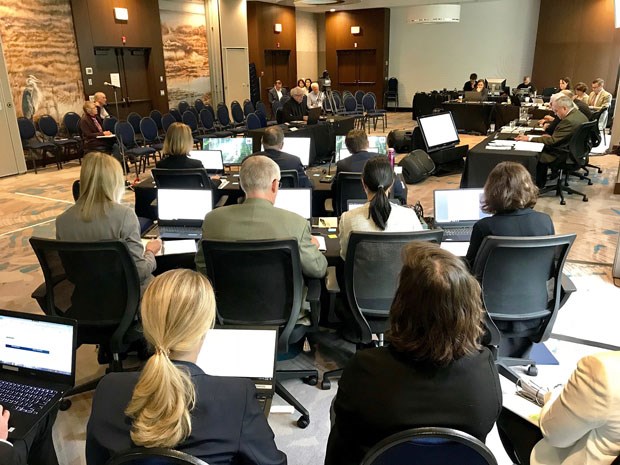It’s either necessary to strengthen the Canadian economy or an unnecessary mega project that will have terrible environmental impacts.
The independent federal review panel heard both sides of the argument on the Port of Vancouver’s proposed Terminal 2 at Roberts Bank during a public hearing that continued Thursday and Friday at the Coast Tsawwassen Inn.
T2 is a proposed three-berth container terminal that would be built on a man-made island adjacent to the existing Deltaport container terminal.
Noting the port’s environmental studies have never been peer-reviewed, Against Port Expansion’s (APE) Roger Emsley was among those scheduled to make a presentation on Friday, talking about “immediate, continuous, not mitigable” effects, while the proposed project lacks economic viability.
According to APE, the project is a “tipping point for Roberts Bank wildlife and ecosystems,” including the elimination of a significant area of biofilm that’s critical feeding grounds for birds.
According to the B.C. Chamber of Commerce, its most recent survey indicated B.C. business has increasingly favourable attitudes towards bringing Canadian products to other markets.
“What our members are telling us is trade is important to their growth, they want B.C. to be an attractive place for investment and we have a hard time getting infrastructure projects approved – the result being congestion and bottlenecks that hurt businesses’ ability to succeed,” the chamber’s submission states.
“The RBT2 Project represents a vital piece of added infrastructure capacity that will help meet growth in trade that is forecasted to flow through the port over the next two decades.”
Also to speak Friday was Jack Bates with the Delta Farmers’ Institute, outlining a number of concerns when it comes to industrial intrusions into the farming community.
“Just in the last 10 years alone, approximately 1,000 acres of prime farmland has been converted to non-agricultural use as a result of the construction of the South Fraser Perimeter Road, industrial development at Boundary Bay Airport, expansion of the B.C. Rail line, settlement of the treaty with Tsawwassen First Nation and now the proposed Terminal 2,” the DFI states.
The DFI is concerned over the cumulative impact as well as implications for the future of farming in Delta.
Anne Murray’s submission on behalf of the Delta Naturalists Society also outlines “grave concerns,” including negative effects on shorebirds, fish, crab, endangered southern resident orcas and other wildlife, effects she notes can’t be adequately mitigated.
Delta resident and community advocate Doug Massey was among the others to make a presentation, outlining several environmental concerns as well.
“The cumulative effects of actions taken and proposed by Port of Vancouver that has caused and threatens the total destruction of the mother of all aquatic and migratory bird life of the Fraser Basin,” Massey warned.
According to Otto Langer with Fraser Voices, “This new fill area will be one of the final nails in the coffin of the valuable fish and migratory bird habitat on Roberts Bank. The public has been very upset with the complexity of the CEAA review as directed to date. The process makes it impossible for the local citizen to have input into such bureaucratic and gantlet type review.”
The review panel will continue to hear submissions in Delta throughout this month before heading to other communities to continue the hearing in June.



